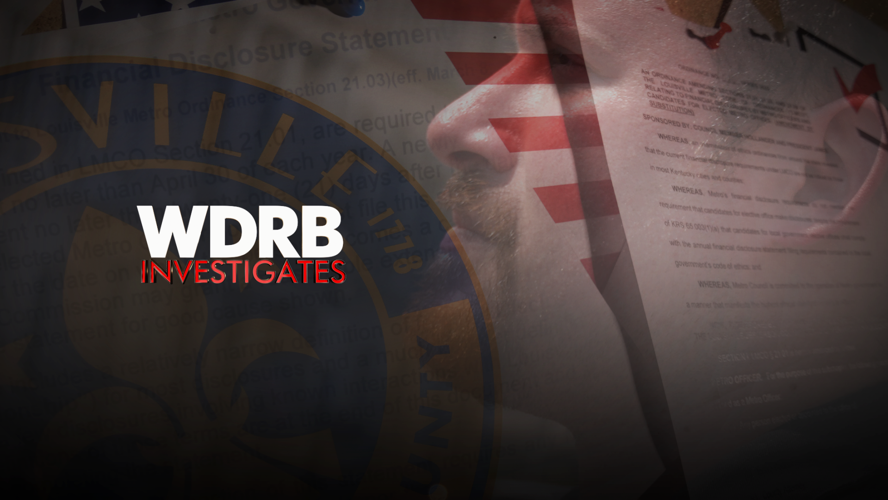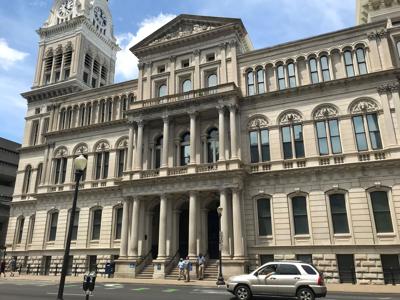LOUISVILLE, Ky. (WDRB) -- Metro Council approved sweeping changes to Louisville's ethics rules in March, broadening what must be reported by candidates for key offices and other top elected and appointed officials.
Once the ordinance took effect March 8, it gave candidates in the May primaries until April 30 to file the new financial disclosures with the city's ethics commission. The deadline would have allowed time for public scrutiny of things such as property and business holdings of those running in partisan races for Louisville mayor, Metro Council, Jefferson County Attorney and other key posts.
But that didn't happen. The ethics commission ultimately extended the filing deadline until after the primary, a decision that made the disclosures a non-factor for voters and campaigns alike.
The new policy was meant to boost transparency and bring Louisville in line with other cities. Its rollout, however, was marked by confusion, delay and last-minute pressure on candidates to submit forms many didn't know were required, a WDRB News investigation found.
Skylar Graudick, a Democrat who campaigned for Louisville mayor, was among 71 candidates notified in a May 11 email from the city's human resources department that the forms were due May 13, the Friday before the May 17 vote.

Democratic mayoral candidate Skylar Beckett Graudick
The ethics commission — whose members are appointed by Mayor Greg Fischer and confirmed by the Metro Council — later agreed to a filing deadline of May 19, two days after the primary vote.
"The whole point of that ordinance would be to inform people," Graudick said. "So to have it about a week or so before the election to get that information out there — it's not a good process."
'Before voters make decisions'
Kentucky law requires cities such as Louisville to create a code of ethics for elected and appointed officials. As part of that code, Metro government must ensure that candidates and others holding top leadership positions file annual financial disclosure statements.
The policy applies to elected offices that include the mayor; Metro Council members; the Jefferson County sheriff; the County Clerk, constables and the coroner. Also covered are appointed officials ranging from department directors to the city's deputy mayor.
But Louisville's standards were "woefully inadequate," Democratic Metro Councilman Bill Hollander said when he introduced an ordinance in February to demand more information about personal and family finances from those officials, as well as from candidates for elected offices.
And he had the upcoming elections in mind: The ordinance explicitly said that candidates in the 2022 elections needed to file the disclosures by April 30, or 2 ½ weeks before the primary.
"It's written so that there would be a requirement that candidates would be reporting before voters make decisions this year," Hollander told WDRB as he filed the legislation.

Metro Councilman Bill Hollander (D-9)
The council unanimously approved the new ordinance in early March. Among the items included with it was a model disclosure form.
The new rules took effect March 8. So why wasn't the April 30 deadline enforced?
"I don't want to be blaming the ethics commission, but the ethics commission did not very promptly come out with a new form or any guidance," Hollander said in an interview last week.
Dave Waskey, chair of the ethics commission, said "it obviously took time for the numerous parties involved to review and finalize the sample financial disclosure form."
Waskey declined several interview requests. But he said in written responses to questions that he "personally became involved on April 6" and "insisted on late in the process" that Jefferson County Attorney Mike O'Connell's office interpret the ordinance.
Further complicating the process were ethics rules already in place for people in elected and appointed positions. And, like candidates, they also had an April 30 deadline to file their updated financial disclosure forms.
"The issue was whether individuals who had already filed previously on the old financial disclosure form which had been distributed by HR and various department heads prior to the ordinance enactment were required to refile on the new form," Waskey said. "This was an issue that was not addressed in the legislation."
The County Attorney's office declined to provide the response it delivered to Waskey on April 18, citing attorney-client privilege. But Hollander said the opinion concluded that anyone who used the old form didn't need to use the new one.
Waskey said "it's obvious that a good faith attempt was made" to have roughly 1,000 people file the disclosures.
He also said "(similar) attempts" were made to tell candidates and some campaign managers about the requirements, even though the ethics commission isn't obligated to do so.
WDRB contacted all 12 candidates who ran in the Democratic and Republican mayoral primaries in May. Of the seven who have responded, none said they were contacted about the requirement before the May 11 email.
Republican mayoral candidate Rob Stark Reishman Jr. said he was aware of changes to the ethics rules and initially looked for the new disclosure form online. He found nothing. Then came the May 11 email giving him and other candidates two days to complete their forms.
"It's really annoying knowing that you've got this disclosure that you need to fill out that you can't find, and then you get it two days prior," he said. "I spoke with other candidates, and they were all like, 'No, I haven't received anything. I haven't heard anything.'"

Republican mayoral candidate Rob Stark Reishman Jr.
Alison Brotzge-Elder, who ran in the Democratic primary for the 9th District Metro Council seat, said it was "surprising to receive an email less than a week before the primary asking for all of that information to be reported in less than 48 hours."
Brotzge-Elder said her campaign followed the ordinance's passage in March and were expecting to be notified about completing the financial disclosures, "but it never came. The fact that we received no initial guidance in March and then the request at the 11th hour was frustrating as a candidate.
"It was also disappointing as a citizen because the late request and reporting deadline pretty much ensured that voters, myself included, would not get to see all of the candidates' financial disclosures; absentee ballots were already being returned and early voting began on May 12."
Should Louisville notify candidates?
As Waskey notes, Louisville's new ordinance doesn't require Metro government or any other entity to tell candidates for public office they must file financial disclosures with the ethics commission. It simply says that candidates "shall be required" to file them with the ethics commission.
That raises the possibility that future candidates in Louisville also could be unaware that they must complete and submit the forms.
Other cities in Kentucky take a different approach. Lexington-Fayette Urban County Government, the Owensboro-Daviess County Board of Ethics and the city of Bowling Green all require ethics agencies to mail or hand deliver the financial disclosure forms to those who must complete them.
Ashley Jackson, the Bowling Green city clerk, said the Warren County Clerk's Office has agreed to provide the financial disclosure forms when candidates file to run for public office.
"It is a perfect time. They're coming in and filing their paperwork. What better way for them to get everything they need at their fingertips?" Jackson said. "And so it's right there at a one-stop shop."
The message, she said, is clear to candidates: "You have a requirement. You must fulfill that obligation and complete this financial interest statement."
Asked if Fischer, a Democrat, supports a similar approach in Louisville, his spokeswoman Jessica Wethington said in an email that "this year was an exception since the Metro Council ordinance passed after the candidate filing deadline."
"In future years," she added, "the County Clerk's Office will include the financial disclosure form in the packet candidates receive when they file to run for an elected position."
Republican Jefferson County Clerk Bobbie Holsclaw's office disputed that claim. In response, Wethington said "Metro has discussed with the County Clerk's Office."
Holsclaw spokesman Erran Huber said the County Clerk's office hasn't agreed to provide the forms.
"As far as we are aware there's been no definitive discussion on forward movement in regards to the Jefferson County Clerk's Office taking over these duties," Huber said. "The best that I can do is refer you to the most recent ordinance, which clearly says that it's provided by the ethics commission."
Metro Council President David James, a Democrat who was a co-sponsor of the financial disclosure ordinance, told WDRB he wasn't aware that candidates needed to file disclosures when he first ran for office. In fact, he said, he didn't submit one as a candidate.
James acknowledged that there needs to be a change so that candidates know what's required of them. "I think it's important that we correct that," he said.
"So my suggestion or thought right now is that we go back and amend the ordinance and say that a particular body has the responsibility to notify candidates."

Copyright 2022 WDRB Media. All Rights Reserved.



